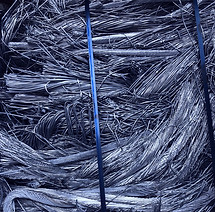

NON-FERROUS METALS - ALUMINIUM
Aluminium is one of the world's most abundant metals and is derived from a mineral called Bauxite. Aluminium is soft and malleable in its pure form. It is one of the lightest engineering metals that is corrosion resistant and conducts electricity well. As a means to increase aluminium's strength and machinability, copper, manganese, silicon, magnesium, and zinc are frequently alloyed with it. According to the elements they are combined with, the aluminium alloys are classified from 1000 series to 8000 series. Aluminium alloys are found in a multitude of applications, from the thinnest foil in your kitchen, conventional beverage cans, beer kegs, consumer electronics, window frames, engine blocks in automobiles to aircraft components. Their applications are ubiquitous.
Even though Bauxite is one of the most abundant metal element in the Earth's crust, recycling aluminium has tremendous environmental benefits. One of the benefits of recycling aluminium is that it uses a small fraction of the energy required to refine the same amount of aluminium from mineral form. As a consequence of the reduced energy consumption, greenhouse gas emissions will be reduced considerably, therefore reducing climate change.
With CMI, we have the capability of identifying and recycling an assortment of identical coloured aluminium, bundling them according to their respective categories, and reintegrating them back into the aluminium value chain.

BARE ALU WIRE

ALUMINIUM BLOCKS

ALUMINIUM FOILS

ALUMINIUM EXTRUSION

ALUMINIUM OR

ALUMINIUM RADIATORS

ALUMINIUM CASTING

ALU THICK CUTTING

ALUMINIUM HEAT SINK

USED BEVERAGE CANS

ALUMINIUM TURNINGS